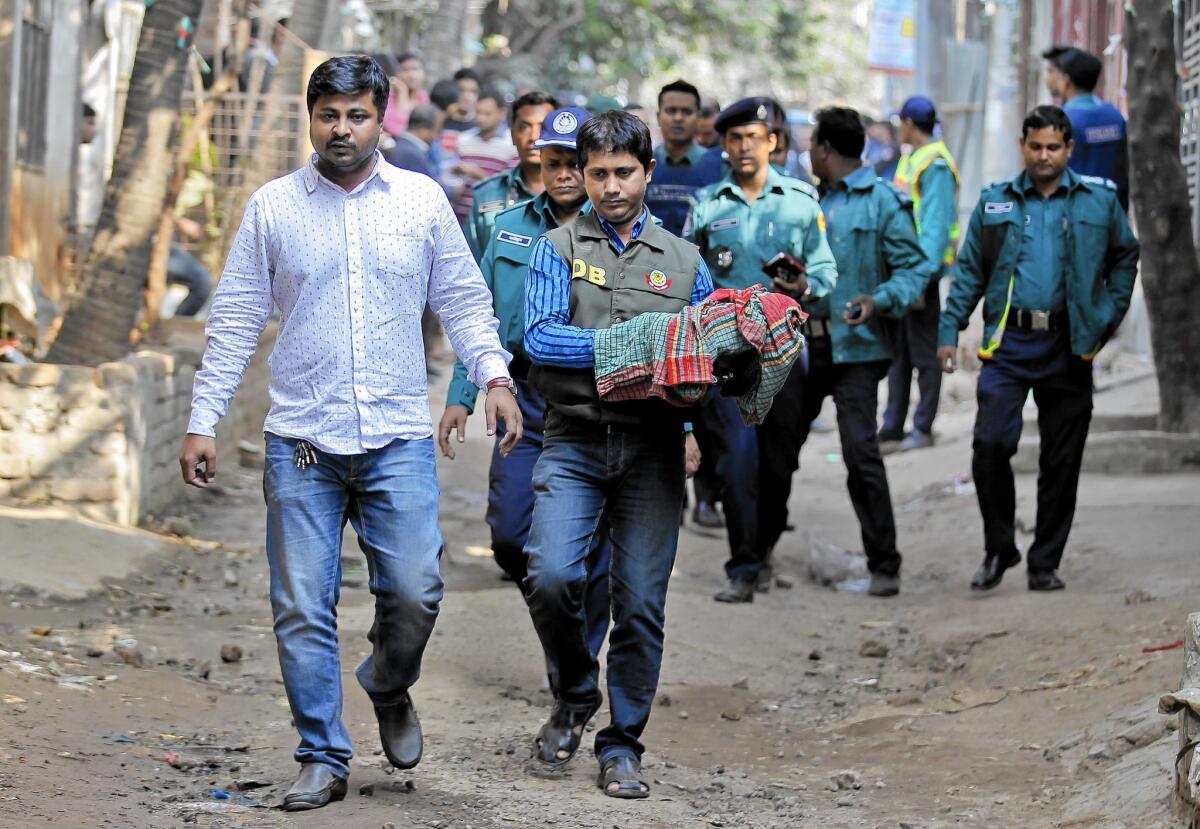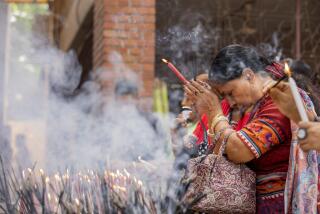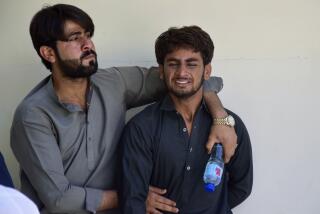Bangladesh reeling after second wave of attacks possibly tied to Islamic State

- Share via
reporting from DHAKA, Bangladesh — It has been nearly a year since Avijit Roy, a Bangladeshi-born American citizen, was hacked to death on the street in this South Asian country’s teeming capital, part of a series of grisly killings of secular writers who criticized Islamic fundamentalism.
But in the last four months, Bangladesh has been stunned by a second wave of deadly attacks — against religious minorities, security forces and foreigners — that is unusual even with the nation’s long history of political violence.
The more recent killings have raised fears that Bangladesh is entering a disturbing new phase of instability inspired from abroad. Islamic State has claimed responsibility for several of the attacks and is stepping up its efforts to recruit from this country of 160 million people, the vast majority Sunni Muslims.
This month, Islamic State said it was behind the latest slaying, of a village doctor in western Bangladesh who reportedly had converted to Christianity. That followed shootings of Italian and Japanese nationals, bombings of Shiite Muslim worshipers, stabbings at a Sufi shrine and other attacks claimed by the Iraq- and Syria-based militant organization.
The Bangladeshi government denies that Islamic State has a presence in the country, but officials acknowledge that its murky pool of homegrown militants could be taking direction from foreign extremists.
“There is an effort by a group of people in different parts of the country — probably being supported from foreign lands — to destabilize Bangladesh,” Mohammed Shahriar Alam, state minister for foreign affairs, said in an interview. “We are not immune to what is happening in the rest of the world. But the government is determined not to allow them to succeed.”
Since an Italian aid worker was gunned down while jogging in Dhaka’s diplomatic quarter Sept. 28, there have been at least 45 attacks across the country, according to the Bangladesh Institute of Peace and Security Studies, an independent think tank. Islamic State or its supporters claimed responsibility for 10 attacks, the institute said.
Others included the slaying of a police constable and an explosion at a mosque in the country’s main naval base in Chittagong — both still shrouded in mystery.
Although the incidents haven’t inflicted a massive death toll, “they have touched all possible targets: sectarian, law enforcement, military, foreigners,” said retired Maj. Gen. A.N.M. Muniruzzaman, president of the institute. “They have covered the whole spectrum.”
The violence has coincided with a prolonged, bitter political crisis that some say has made Bangladesh — which prides itself on religious tolerance — more vulnerable to extremism.
Since taking office in 2009 — and solidifying her power in a 2014 election marred by an opposition boycott — Prime Minister Sheik Hasina Wajed has gone after Islamist political rivals with the stated goal of protecting the secularism enshrined in Bangladesh’s Constitution.
The largest Islamist party, Jamaat-e-Islami, has been banned from politics and most of its top leaders convicted by a domestic tribunal Hasina established for crimes committed during the 1971 war of independence from Pakistan.
Join the conversation on Facebook >>
Three senior Jamaat officials and a leader of the main opposition party have been put to death since 2013 despite allegations from human rights groups — and the Obama administration’s former ambassador for war crimes — that the trials were unfair. Jamaat protests against the verdicts have often turned violent.
After the recent killings, Hasina and other officials publicly blamed Jamaat, although the party denies involvement and has condemned the violence.
The government regards Jamaat as culpable partly because of its links to Jamaat-ul-Mujahideen Bangladesh, or JMB, a banned domestic militant group that carried out coordinated bombings in all 64 districts nationwide in 2005. Authorities have raided hide-outs and arrested several JMB suspects, including some believed to have been active in Jamaat within the last several years.
A November article in Dabiq, Islamic State’s propaganda magazine, calls JMB “a proper jihad organization,” prompting speculation of an alliance. Titled “The Revival of Jihad in Bengal,” the article signaled for the first time the militant organization’s designs on Bangladesh and said it had named a regional leader in the country.
Matiur Rahman Akanda, a member of Jamaat’s working committee, said the party has “no responsibility over people who are not with us any longer,” referring to JMB members who were once active with Jamaat-e-Islami. He blamed the government’s crackdown on opponents — more than half the 30-member working committee is behind bars — for fueling unrest.
“When there is no democracy, violence may arise,” Akanda said. “If the government gave the people of Bangladesh the opportunity to raise their voices, there would be no violence.”
Although bloggers had been in the crosshairs of domestic militants as far back as 2013 — authorities have arrested members of an Al Qaeda-linked group that had compiled a “hit list” of secular writers — Bangladesh had seen none of the Sunni-Shiite strife that afflicts the Arab world.
That changed Oct. 24, when homemade bombs were hurled at a crowd observing the annual Ashura ritual at Dhaka’s most important Shiite shrine, killing one person and wounding dozens. An attack on a Shiite mosque in the countryside followed a month later. One person was killed and three injured.
“Right now Shiites are concerned about their safety and security in all of Bangladesh,” said Firoz Hossain, superintendent of the management committee of Hussaini Dalan, the Dhaka shrine.
“After the Ashura attack the whole outlook for Hussaini Dalan changed. Before the attack around 1,000 visitors, including foreigners, came here every day. But now the number is around 100.”
Islamic State claimed responsibility for both attacks. But Hasina and other officials have dismissed reports of the group’s activity in Bangladesh as a “conspiracy” to open the door to foreign military intervention.
Many secular activists worry that the government is in denial about the threat, yet say they are increasingly reluctant to speak out as Hasina consolidates power.
Editors of two of the country’s main independent newspapers, Prothom Alo and the English-language Daily Star, said more than two dozen major private companies have pulled advertising from their pages, reportedly under pressure from officials unhappy with their coverage.
“I think we are at serious risk, and downplaying and politicizing the threat doesn’t help,” said Badiul Alam Majumdar, secretary of Shujan, a group that advocates for good governance. “The strategy has been to silence dissenting voices. If it continues, none of us will be safe.”
Special correspondent Mohiuddin Kader contributed to this report.
NEWSLETTER: Get the day’s top headlines from Times Editor Davan Maharaj >>
ALSO
Five years later, the voices of dissent are long gone from Tahrir Square
Henry Worsley dies at 55; British adventurer crossing Antarctic alone perishes just short of goal
EU police warn of more Islamic State attempts at large-scale attacks
More to Read
Sign up for Essential California
The most important California stories and recommendations in your inbox every morning.
You may occasionally receive promotional content from the Los Angeles Times.











